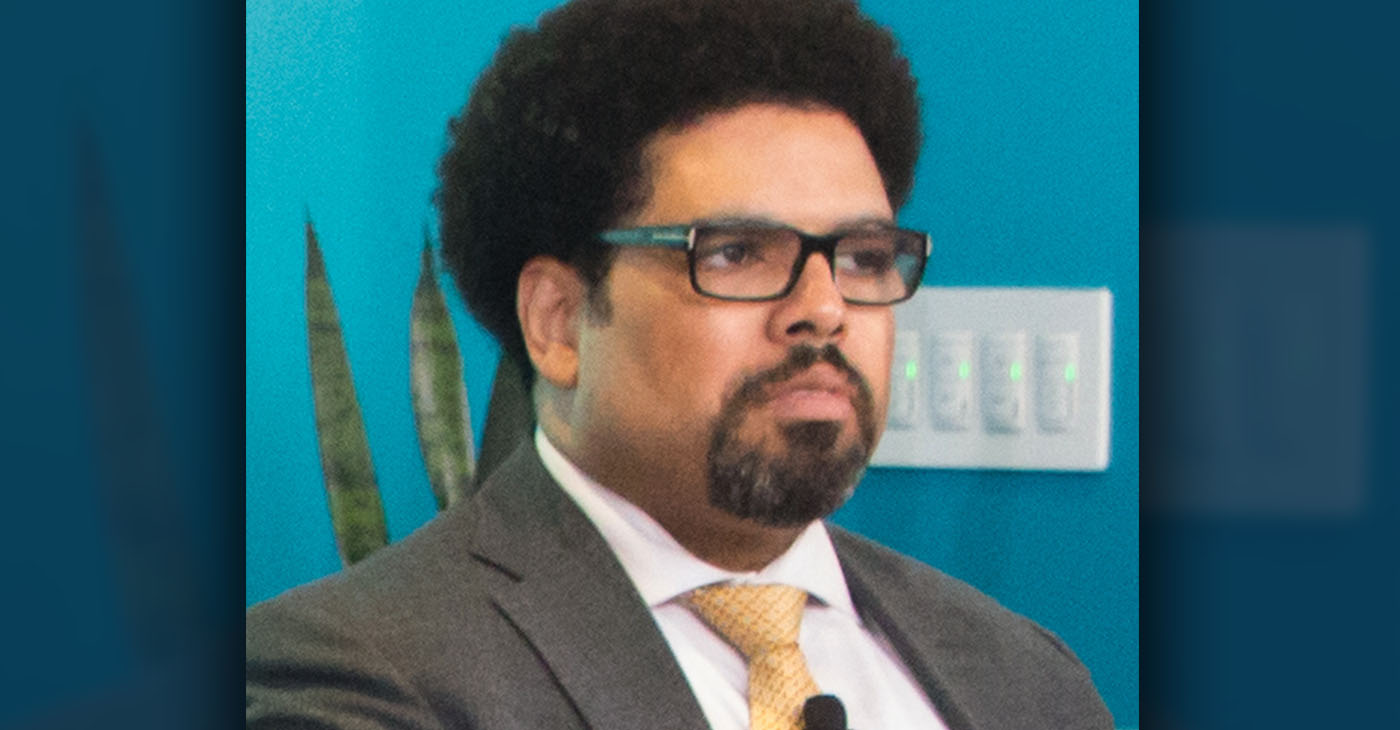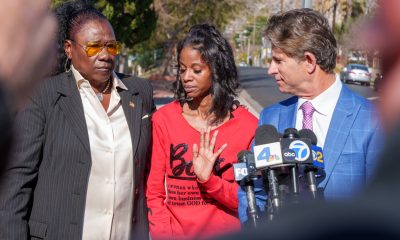Activism
California Reparations Task Force Votes to Replace Economic Advisor
Darrick Hamilton, who was expected to bring an economic perspective to the work the group is doing, told the task force that there was some misunderstanding about the work he could provide. “I don’t think we had complete clarity at the time the (Department of Justice) made its presentation in October or September,” Hamilton said. “With F, I have great clarity given the time constraints as well as the potential budgets that are available.”

By Antonio Ray Harvey | California Black Media
One day after Darrick Hamilton testified before California’s Task Force to Study and Develop Reparation Proposals for African Americans, the panel decided that it would not enter into a contractual agreement with the noted economist.
Seven members of the nine-member panel voted to move forward without Hamilton. Two appointees, Loyola-Marymount psychology professor Dr. Cheryl Grills and UCLA law professor Lisa Holder, abstained.
The group’s chair Kamilah Moore said Hamilton informed the task force that he would have to narrow the responsibilities of his role, from advising on both calculations and methodology, to a “renewed or narrower scope of work.”
“I feel that the work is inseparable,” Moore said before the vote.
Hamilton was expected to bring an economic perspective to the work the group is doing, helping to quantify past economic injustices African Americans faced in the state and elsewhere, and determining what or how much compensation should be for Black people living in California.
California Gov. Gavin Newsom signed the state’s historic reparations bill into law, Assembly Bill (AB) 3121, in 2020. Former Assemblymember Dr. Shirley Weber (D-San Diego) authored the bill before she was appointed and sworn in as the state’s first African American Secretary of State in January 2021.
AB 3121, titled “The Task Force to Study and Develop Reparation Proposals for African Americans,” created a nine-member commission to investigate the history of slavery in the United States, the extent of California’s involvement in slavery, segregation, and the denial of Black citizens their constitutional rights.
In October, the task force approved the appointment of Hamilton, who is an economics and urban policy professor at The New School in New York City.
According to Section F of Article 2, 8301.1, of the legislation, Hamilton would have been charged with affixing “what form of compensation should be awarded, through what instrumentalities, and who should be eligible for such compensation.”
The contract would have paid Hamilton $90,000 for the scope and term of his work, Moore said. But the reduced assignment the economist requested decreases his compensation to $45,000.
“Fast forward to (Decemer 7), Dr. Hamilton essentially communicated to the task force that while he’s still able to deliver on Section F, he will no longer be able to deliver on Section E,” Moore said. “That would be doing the actual calculations for what any compensation should be. He meant that there weren’t enough resources present in the given contract, he felt that he didn’t have enough time, and he also pointed out issues of clarity on how to tackle that part of the bill.”
Hamilton told the task force that there was some misunderstanding about the work he could provide.
“I don’t think we had complete clarity at the time the (Department of Justice) made its presentation in October or September,” Hamilton said. “With F, I have great clarity given the time constraints as well as the potential budgets that are available.”
Michael Newman, the Senior Assistant Attorney General of the California Department of Justice’s Civil Rights Enforcement Section, said the DOJ was still in negotiation with Hamilton before the task force’s fifth meeting and no contracts had been signed.
“To my knowledge, he has not done any reimbursable work under the contract. The contract has not been signed,” Newman said. “Other than sort of scoping out the project, doing the initial evaluation, or preparing for his testimony, he hasn’t done anything on the project. I think he’s accrued probably reimbursable time in his initial preparation, but we’ll have to talk about that.”
Hamilton, a leading national authority on race and public policy, has been involved in crafting progressive policy proposals, such as Baby Bonds, which are trust accounts for low-income kids funded by taxpayers.
Hamilton is also a proponent of the Federal Job Guarantee, a policy that would mandate the government to provide a job for any person that needs one. Those initiatives have garnered national media attention and served as inspiration for legislative proposals across the country at the federal, state, and local levels.
In his defense, Grills said Hamilton’s knowledge, intellect and skill set are absolutely not “limited.” Hamilton is more than capable of performing the task, she explained, and said that he wanted to make sure both Section E and F would be completed thoroughly.
“I think he’s trying to caution us about what it really takes to do a careful set of calculations that are aligned with how we are defining some of the factors and understanding the costs,” Grills said. “He’s offering caution about what it takes and to do it in a way that minimizes the negative feedback that we will get on everything we do.”
With five meetings left on the agenda, Moore said that the task force will consider the services of William A. “Sandy” Darity Jr., the director of the Samuel DuBois Cook Center on Social Equity at Duke University. He is also the Samuel DuBois Cook professor of public policy, African and African American studies, and economics at Duke University.
Darity’s research focuses on racial, class and ethnic inequality and stratification economics; education and the racial achievement gap; North-South theories of trade and development; and the economics of reparations.
Darity and Kirsten Mullen, co-authors of the book, “From Here to Equality: Reparations for Black Americans in the 21st Century,” testified before the task force during the first meeting in June.
Task Force member Don Tamaki said that Darity absolutely has the “stature” in terms of notoriety and has arrived at a number in his and Mullen’s book “anywhere from $9 trillion to $14 trillion” in terms of reparations.
As did Grills, Tamaki also warned that it doesn’t matter who does the work for 8301.1 Sections E and F. The report will get backlash, he said.
“The report is going to get criticized, scrutinized, and really taken apart,” Tamaki said. “So, it really has to be a first-rate expert in this area.
Activism
Oakland Post: Week of January 1 – 7, 2025
The printed Weekly Edition of the Oakland Post: Week of January 1 – 7, 2025

To enlarge your view of this issue, use the slider, magnifying glass icon or full page icon in the lower right corner of the browser window.
Activism
Racially Motivated Violence Against Black Teen Prompts $10 Million Claim Against LAUSD
In December, a second altercation, on a video shared with news media, showed 4 to 6 boys attacking a Black student and using racial slurs. The video also shows a person in a safety vest trying to stop the fight and telling them to “handle it after school.” Then, the video ends.

By Solomon O. Smith, California Black Media
A distraught mother and her legal team announced a $10 million lawsuit against the Los Angeles Unified School District (LAUSD) on Dec. 16, alleging that her son was the target of bullying because of his race.
“CS DOE is a 14-year-old African American student at Verdugo High School. He is a Ninth Grader,” reads a statement the plaintiff’s attorneys shared with California Black Media (CBM).
“Almost from the first day of class (in August 2024), CS DOE was targeted by Latino students who called him racial slurs, physically attacked him and threatened to stab him.”
The family’s identity has not yet been released to the public due to safety concerns, according to their attorneys Bradley C. Gage and Caree Harper. The student’s mother is identified only as A.O. in the complaint.
The first video, filmed in August, showed several non-Black students punching and kicking a Black student in a bathroom on campus while yelling racial slurs. The mother claims that the students who attacked her son were not punished, and the administration asked her to move her son to another school for his safety.
“They wanted him to leave the school without giving any disciplinary action towards those students,” said the student’s mother. “He’s not going anywhere. He’s going to finish. I wanted him to at least stay until the December winter break, and then I was going to transfer schools for him.”
Before she could enroll her son in a different school the attacks escalated.
In December, a second altercation, on a video shared with news media, showed 4 to 6 boys attacking a Black student and using racial slurs. The video also shows a person in a safety vest trying to stop the fight and telling them to “handle it after school.” Then, the video ends.
CS DOE, a 14-year-old freshman, left the school but was followed by a car, according to Gage. Several individuals exited the vehicle, one with a “large butcher knife.” A fight ensued and two people were stabbed. The Black student was arrested for assault with a deadly weapon but was later released into his mother’s custody.
The high school freshmen is scheduled to appear in juvenile court on Feb. 1, but Harper says she will reach out to the District Attorney and make the case against charging the young man.
“His mama had to go find him because he was hiding and fleeing for his very life,” said Harper.
According to the boy’s mother, the young student is still traumatized and has not been able to return to the area because it remains unsafe. Racial slurs have also been spray painted on their home.
“I’m sad. I’m devastated, you know,” said the mother. “I still feel like they’re after him. I still feel like they can kill him, possibly.”
The LAUSD and principal of Verdugo High School did not respond to CBM’s requests for comment.
If you are – or someone you know is – has experienced a hate crime or hate incident, please visit CAvsHate.org for more information and to find out what you can do about it.
Activism
2024 In Review: 7 Questions for the California Association of Black School Educators
CABSE members represent governmental agencies, charter schools and charter school organizations, public school districts, traditional public schools, and community colleges. The organization’s primary goal is to expand PK-14 educational opportunities for all students in California, with an emphasis on under-represented and under-served Black students.

By Edward Henderson, California Black Media
The California Association of Black School Educators (CABSE) is an organization consisting of elected and appointed school officials, administrators and instructors from across California who are committed to advancing equity for Black students.
CABSE members represent governmental agencies, charter schools and charter school organizations, public school districts, traditional public schools, and community colleges.
The organization’s primary goal is to expand PK-14 educational opportunities for all students in California, with an emphasis on under-represented and under-served Black students.
California Black Media (CBM) spoke with CABSE President Satra Zurita and Conference Chair Micah Ali about this year’s successes, disappointments, and plans for the organization coming into the new year.
Looking back at 2024, what stands out to you as your most important achievement and why?
Ali: I would have to say that two highlights have been the ongoing support of the Bill and Melinda Gates Foundation, Engie, and other sponsors that have enabled us to bring together like-minded education leaders twice a year to collectively advance innovative and meaningful strategies to achieve change on behalf of Black students across our state.
How did your leadership and investments contribute to improving the lives of Black Californians?
Zurita: CABSE’s leadership and investment in improving the education system for Black students in our great state has resulted in a long-standing focus on transforming public education and its response to Black students. By pulling from the very wisdom of those educators and leaders who care deeply about Black students and who are showing great promise through their efforts.
What frustrated you the most over the last year?
Zurita: Continuing to see the deep impact of COVID-19 Pandemic school site closures on students academically and emotionally — especially Black students. This makes our work and our advocacy more vital than ever.
CBM: What inspired you the most over the last year?
Zurita: Seeing our CABSE convenings grow in depth and breadth — our strategies, powerful content and reach.
What is one lesson you learned in 2024 that will inform your decision-making next year?
Ali: Our Blueprint for Education Equity is a crowd-sourced framework of strategies that have shown great promise for improving the education experiences and opportunities for Black students. In 2024, we developed an equity self-assessment tool for districts to use in evaluating their own efforts on behalf of Black students. Strategies are helping Black students.
In one word, what is the biggest challenge Black Californians face?
Zurita: Many Black students across our state are dealing with a host of challenges: homelessness, food insecurity, exposure to violence, not to mention bias remains a pervasive problem. To add to the challenge, educators are worn out, tired, and frustrated. We now need to think about how we can simultaneously inspire and empower students and educators alike. The system needs an overhaul.
What is the goal you want to achieve most in 2025?
Zurita: In 2025, we hope to stand CABSE up as a fully functioning non-profit organization engaged in research and policy design.
Ali: We also aim to deepen the content of our convenings, including adding a Math Track and what we are calling Social Determinants of Education Track to our annual conference and institute, which will address those social contexts that prevent Black students from realizing their potential as students.
-

 Activism2 weeks ago
Activism2 weeks agoBooks for Ghana
-

 Activism3 weeks ago
Activism3 weeks agoPost News Group to Host Second Town Hall on Racism, Hate Crimes
-

 Activism3 weeks ago
Activism3 weeks agoButler, Lee Celebrate Passage of Bill to Honor Congresswoman Shirley Chisholm with Congressional Gold Medal
-

 Arts and Culture2 weeks ago
Arts and Culture2 weeks agoPromise Marks Performs Songs of Etta James in One-Woman Show, “A Sunday Kind of Love” at the Black Repertory Theater in Berkeley
-

 Activism3 weeks ago
Activism3 weeks agoDelta Sigma Theta Alumnae Chapters Host World AIDS Day Event
-

 Activism2 weeks ago
Activism2 weeks ago‘Donald Trump Is Not a God:’ Rep. Bennie Thompson Blasts Trump’s Call to Jail Him
-

 Business3 weeks ago
Business3 weeks agoLandlords Are Using AI to Raise Rents — And California Cities Are Leading the Pushback
-

 Activism3 weeks ago
Activism3 weeks agoOakland Post: Week of December 11 – 17, 2024



















































